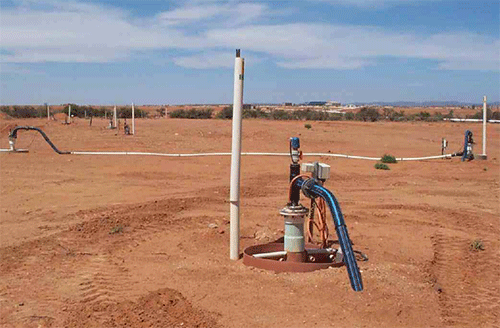Nganate in desperate push for uranium ...asks what dying residents have to lose

Source: New Era Live
MARIENTAL - Omaheke governor Pijoo Nganate has said they cannot continue swimming in a pool of poverty while there is a resource that could change their lives forever.
His remarks come hot on the heels of revelations that Omaheke recorded 300 cases of malnutrition in six months - from January to June, including 263 admissions, nine readmissions and 26 deaths.
Nganate made the remarks in Mariental, Hardap's capital, at the same event where agriculture minister Calle Schlettwein adopted a cautious approach to uranium extraction in the region. Schlettwein said: "We cannot survive without water and food, but we can live without coal or uranium.
Therefore, we believe it is our duty, as government and responsible citizens, to be cautious about all activities that could negatively impact our scarce, life-giving resource - water."
However, Nganate painted a worrisome picture, one wherein the region's most destitute are left to their own devices while affluence lies below their feet. In advancing his argument, the usually soft-spoken governor did not mince his words.
He hopes uranium exploration in parts of his region can turn around fortunes for residents. The only drawback is the proposed uranium extraction method that is bothering residents.
"People in my region ask, 'What do we have to lose if we are anyway dying next to this water, and this water does not mean anything to us? These people are affected by poverty. They hardly have a glass of water, and you are telling them about water contamination," said the governor. An emotional Nganate added that experts should now talk, and the community should do away with conspiracy theories and listen to facts.
"I'm sure there must be a safe way to mine this mineral that can uplift my people out of poverty. When I die one day, I don't want my children to pee on my grave because I was not able to save them from poverty. I also do not want them to pee on my grave because I caused the death of so many people," he said. He made these comments earlier this week during the opening of a high-level meeting on the impact of uranium mining in the Stampriet Transboundary Aquifer System.
Russia's State Atomic Energy Corporation (Rosatom) is the mother company of Uranium One, which has created Namibian subsidiary Headspring Investments.
Headspring is leading the Omaheke uranium project. The project is, however, hanging by a thread after environmentalists and local farmers remain resolute in their resolve - opposing it. Their rejection is hinged on the contention that the proposed uranium extraction method's risks outweigh the benefits. The dominant fear is the contamination of the scarce underground water resources in the area. In addition, Hardap governor Salomon April remains hopeful that Namibians in the southern part of the country could benefit from natural resources in the area.
Hardap is home to over 106 000 people, according to the latest population statistics. "Covid-19 has caused serious damage, and now the drought. It is a struggle to get our people to survive. People are frustrated out there, and they want us to expedite processes like this one of uranium exploration," he said. He advised officials at the event that it is imperative to keep citizens informed of any new developments. This, he said, is because people are desperate, and they are running out of patience.
Cattle breeding is the primary agricultural activity in the Omaheke region. However, this essential economic activity is losing relevance as the region faces serious challenges of malnutrition, rising poverty levels, plummeting cattle numbers and widespread unemployment.
Poverty levels in Omaheke have reached a staggering 39%, while some 52% of Omaheke's 102 000 inhabitants have no steady income.
